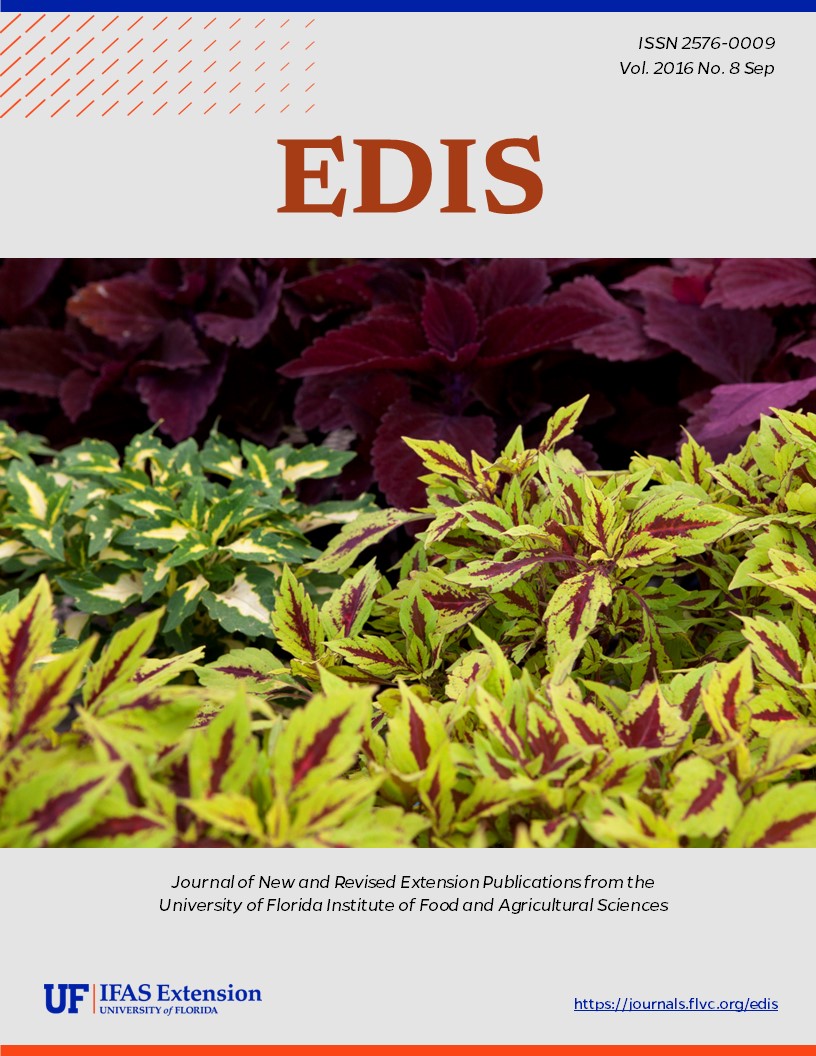Abstract
This EDIS publication is an alternate version of a page published first on the Featured Creatures website. The Featured Creatures collection provides in-depth profiles of insects, nematodes, arachnids and other organisms relevant to Florida. These profiles are intended for the use of interested laypersons with some knowledge of biology as well as academic audiences. This 3-page fact sheet that discusses the longtailed mealybug was written by Morgan A. Byron and Jennifer L. Gillett-Kaufman, and published by the UF Entomology and Nematology Department, October 2016.
References
Culbert DF. (1995). Florida coonties and Atala butterflies. MG347. Gainesville: University of Florida Institute of Food and Agricultural Sciences. (5 September 2019)
Dentener PR, Bennett KV, Hoy LE, Lewthwaite SE, Lester PJ, Maindonald JH, Connolly PG. 1997. Postharvest disinfestation of lightbrown apple moth and longtailed mealybug on persimmons using heat and cold. Postharvest Biology and Technology 12: 255-264. https://doi.org/10.1016/S0925-5214(97)00051-3
Douglas N, Krüger K. 2008. Transmission efficiency of Grapevine leafroll-associated virus 3 (GLRaV-3) by the mealybugs Planococcus ficus and Pseudococcus longispinus (Hemiptera: Pseudococcidae). European Journal of Plant Pathology 122: 207-212. https://doi.org/10.1007/s10658-008-9269-2
Faber BA, Morse JG, Hoddle MS. (2007). UC IPM pest management guidelines: Avocado. UC ANR Publication 3436. University of California Agriculture and Natural Resources. (5 September 2019)
Furness GO. 1976. The dispersal, age-structure and natural enemies of the long-tailed mealybug, Pseudococcus longispinus (Targioni-Tozzetti), in relation to sampling and control. Australian Journal of Zoology 24: 237-247. https://doi.org/10.1071/ZO9760237
Goolsby JA, III. 1994. Biological control of longtailed mealybug, Pseudococcus longispinus (Targioni-Tozzetti) (Homoptera: Pseudococcidae) in the interior plantscape. Dissertation, Texas A&M University. (5 September 2019)
Kot I, Kmiec K, Gorska-Drabik E, Golan K, Rubinowska K, Lagowska B. 2015. The effect of mealybug Pseudococcus longispinus (Targioni Tozzetti) infestation of different density on physiological responses of Phalaenopsis × hybridum 'Innocence'. Bulletin of Entomological Research 105: 373-380. (5 September 2019) https://doi.org/10.1017/S000748531500022X
Maree HJ, Almeida RPP, Bester R, Chooi KM, Cohen D, Dolja VV, Fuchs MF, Golino DA, Jooste AEC, Martelli GP, Naidu RA, Rowhani A, Saldarelli P, Burger JT. 2013. Grapevine leafroll-associated virus 3. Frontiers in Microbiology 4: 1-21. (5 September 2019) https://doi.org/10.3389/fmicb.2013.00082
Ray HA, Hoy MA. 2014. Effects of reduced-risk insecticides on three orchid pests and two predacious natural enemies. Florida Entomologist 97: 972-978. https://doi.org/10.1653/024.097.0355
Saccaggi DL, Kruger K, Pietersen G. 2008. A multiplex PCR assay for the simultaneous identification of three mealybug species (Hemiptera: Pseudococcidae). Bulletin of Entomological Research 98: 27-33. https://doi.org/10.1017/S000748530700538X
Tenbrink VL, Hara AH. (2007). Pseudococcus longispinus (Targioni-Tozzetti), longtailed mealybug. Crop Knowledge Master, University of Hawaii. (5 September 2019)
Warner J, Scheffrahn RH, Cabrera B. (2002). White-footed ant, Technomyrmex difficilis Forel. EENY-273. Gainesville: University of Florida Institute of Food and Agricultural Sciences. (5 September 2019)
Waterworth RA, Wright IM, Millar JG. 2011. Reproductive biology of three cosmopolitan mealybug (Hemiptera: Pseudococcidae) species, Pseudococcus longispinus, Pseudococcus viburni, and Planococcus ficus. Annals of the Entomological Society of America 104: 249-260. https://doi.org/10.1603/AN10139

